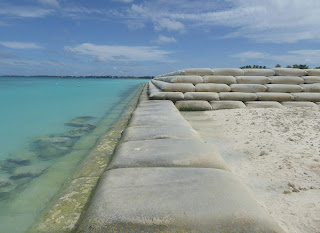countries on the brink
Like Nauru, Kiribati and Tuvalu were quite sad places to visit, both for their history (rusting tanks, gun emplacements, etc) and for the litter, abandoned cars, etc, from their present-day occupants. But also from the threat of rising sea level resulting from climate change.
Tuvalu is taking steps (largely funded by the UNDP's Green Climate Fund) to build up its landmass against the sea, with thousands of sacks of some 'geotextile' mineral - imported from Fiji - providing a barrier, within which they have deposited some 250,000 cubic metres of sand dredged from the sea the other side. now filling an area covering some 7 hectares. The aim is to provide flood-free land to protect against sea level rise and the larger waves which come with cyclones. I read that on completion in early 2024, this will be the highest land on the island – around 2.4 metres above the highest tide – and should remain flood-free and safe for at least the next 80 years.
Of course it is good to see steps being taken to improve their situation, but it did feel to me as though humans should not really be trying to live in such a place. & if they do, they should be taking steps to minimise the damage that they themselves are doing to the environment, for example by running a bus service along the length of the island rather than every family having their own car. I did at least see a few solar panels. But if things go wrong, the Falepili Union treaty with Australia gives the latter veto power over Tuvalu's foreign security arrangements in exchange for allowing Tuvaluans displaced by climate change to immigrate to Australia. I note that the total population of the country is little over 11,000!
I suppose the interest of China in these Pacific island nations, as it tries to consolidate and strengthen its position in the region, may lead to some improvement in their situation as the Chinese government funds various projects (and exploits their resources...). Tuvalu, however, is still one of the twelve countries in the world that support Taiwan rather than China, and I doubt Taiwan is able to spend the same kind of money. Our tour group was hosted for dinner at the Taiwanese Ambassador's house, which was very nice but rather strange. I suppose (1) there is little to occupy his time there, and (2) they need all the friends they can get, so why not host a group of tourists from around the globe?





Comments
Post a Comment